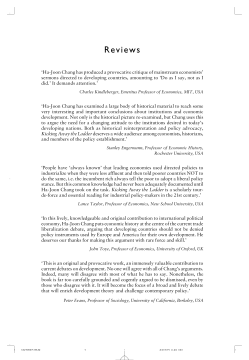
Additional Information
Book Details
Abstract
How did the rich countries really become rich? In this provocative study, Ha-Joon Chang examines the great pressure on developing countries from the developed world to adopt certain 'good policies' and 'good institutions', seen today as necessary for economic development. His conclusions are compelling and disturbing: that developed countries are attempting to 'kick away the ladder' with which they have climbed to the top, thereby preventing developing countries from adopting policies and institutions that they themselves have used.
How did the rich countries really become rich? In this provocative study, Ha-Joon Chang examines the great pressure on developing countries from the developed world to adopt certain 'good policies' and 'good institutions', seen today as necessary for economic development. Adopting a historical approach, Dr Chang finds that the economic evolution of now-developed countries differed dramatically from the procedures that they now recommend to poorer nations. His conclusions are compelling and disturbing: that developed countries are attempting to 'kick away the ladder' with which they have climbed to the top, thereby preventing developing counties from adopting policies and institutions that they themselves have used. This book is the winner of the 2003 Myrdal Prize, European Association of Evolutionary Political Economy.
For more information please see the book website: http://kickingawaytheladder.anthempressblog.com
'…An original and immensely valuable contribution to current debates on development.' —Peter Evans, Professor of Sociology, University of California, Berkeley
'A scholarly tour-de-force… Essential reading for industrial policy-makers in the twenty-first century.' —Lance Taylor, Professor of Economics, New School University
'The most important book about the world economy to be published in years.' —'Prospect'
'A provocative critique of mainstream economists' sermons directed to developing countries… It demands attention.' —Charles Kindleberger, Emeritus Professor of Economics, MIT
Ha-Joon Chang teaches at the Faculty of Economics and Politics, University of Cambridge.
'This book is a joy: a fantastically useful teaching aid…a very necessary historical conscience in an age of amnesia.' —'The Business Economist'
'…A lively, knowledgeable and original contribution to international political economy.' —John Toye, Professor of Economics, University of Oxford
'This is an intriguing book that raises important issues. Recommended.' —J. M. Nowakowski, Muskingum College, in ‘Choice’
‘Highly relevant to today’s debates about the role of policies and institutions in development as well as the role of government in general… It is a great contribution, not least for its historical approach, and will continue to influence the debate on development.’ —Seb Bytyçi, ‘ID: International Dialogue, A Multidisciplinary Journal of World Affairs’
Table of Contents
| Section Title | Page | Action | Price |
|---|---|---|---|
| Front Matter | 1 | ||
| Reviews | 1 | ||
| Series Page | 2 | ||
| Title Page | 3 | ||
| Copyright | 4 | ||
| Acknowledgments | 5 | ||
| Table of Contents | 7 | ||
| Main Matter | 9 | ||
| Chapter 1. Introduction: How did the Rich Countries Really Become Rich? | 9 | ||
| 1.1 Introduction | 9 | ||
| 1.2. Some Methodological Issues: Drawing Lessons from History | 11 | ||
| 1.3. The Chapters | 17 | ||
| 1.4. A 'Health Warning' | 20 | ||
| Chapter 2. Policies for Economic Development: Industrial, Trade and Technology Policies in Historical Perspective | 21 | ||
| 2.1. Introduction | 21 | ||
| 2.2. The Catch-up Strategies | 27 | ||
| 2.3. The Pulling-Ahead Strategy by the Leader and the Responses of the Catching-up Countries - Britain and its Followers | 59 | ||
| 2.4. Policies for Industrial Development: Some Historical Myths and Lessons | 66 | ||
| Chapter 3. Institutions and Economic Development: 'Good Governance' in Historical Perspective | 77 | ||
| 3.1. Introduction | 77 | ||
| 3.2. The history of instutional development in the developed countries | 79 | ||
| 3.3. Institutional development in developing countries then and now | 118 | ||
| Chapter 4. Lessons for the Present | 133 | ||
| 4.1. Introduction | 133 | ||
| 4.2. Rethinking Economic Policies for Development | 133 | ||
| 4.3. Rethinking Institutional Development | 137 | ||
| 4.4. Possible Objections | 143 | ||
| 4.5. Concluding Remarks | 147 | ||
| End Matter | 151 | ||
| References | 151 | ||
| Notes | 169 | ||
| Index | 189 |
